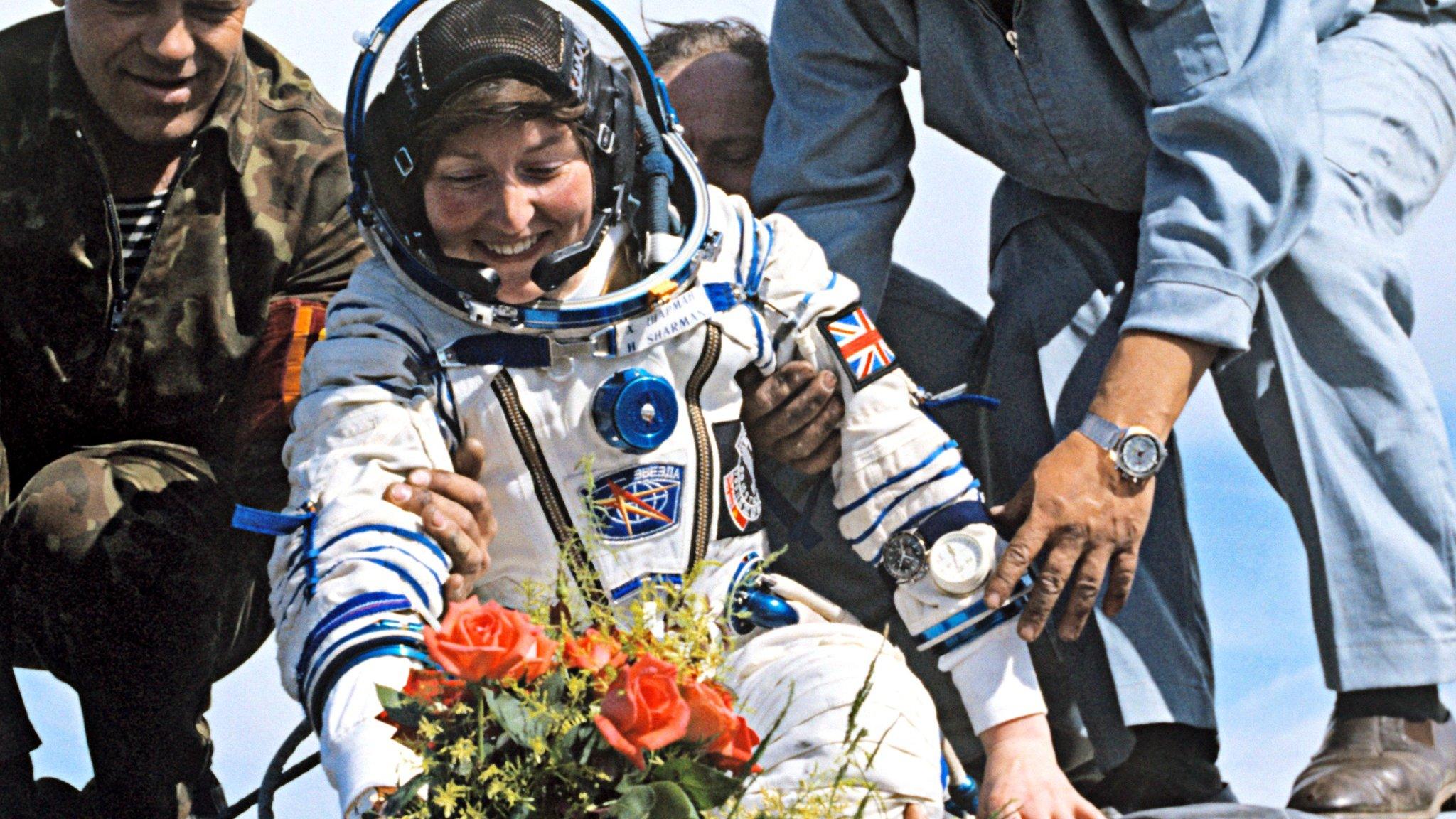First UK astronaut calls for more Brits in space
- Published
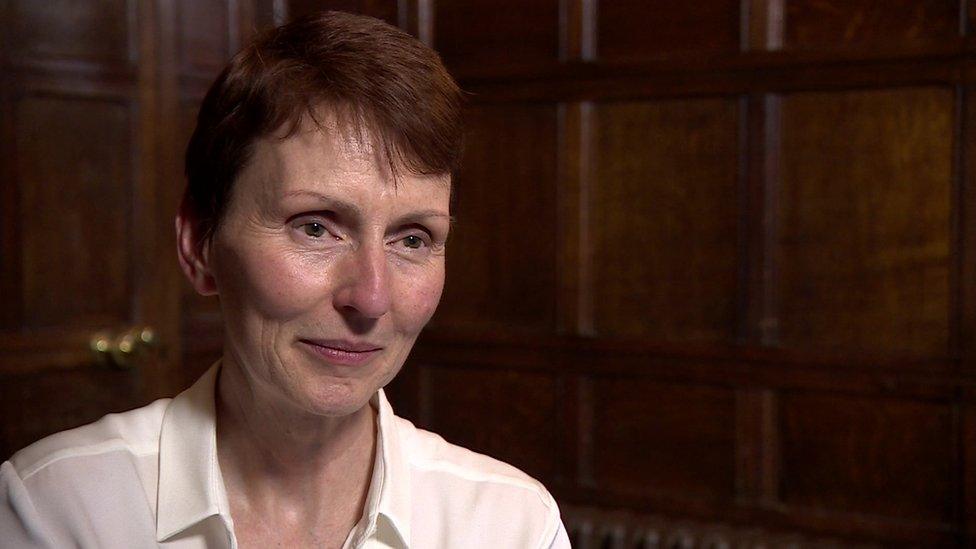
Ms Sharman said it was the UK's "last chance" to get involved in "the future of the human race"
Britain's first astronaut has said the UK risks becoming a "backward nation" if the government does not pay to send more people into space.
Helen Sharman believes the country would lose many of the benefits of Tim Peake's mission if a commitment to more flights is not made very soon.
Ms Sharman said that this was the UK's "last chance" to be involved "in the future of the human race".
She spoke to BBC News on the eve of the 25th anniversary of her spaceflight.
The government has effectively paid for one spaceflight, Tim Peake's, according to Ms Sharman. After he returns to Earth in June, it is unlikely there will be more UK astronauts in space unless the nation makes a further commitment of funds at a ministerial meeting of European Space Agency (Esa) member states later this year.
Helen Sharman: "Don't let Tim Peake be our last astronaut"
"Tim will continue with his training at the European Space Agency but if we don't fund any more then he won't get a second flight," she warned.
"We don't lose all the science that we have done, we don't lose the enthusiasm of the young people for science - but where are we in the UK? Just another backward nation that is not participating on the international stage, in the future of the human race?
"We are a travelling nation; we have explored for centuries and I think it's almost in our blood. It is something that Britain wants to do, Britain needs to do and we have got to continue that funding."
Ms Sharman was sent to the Soviet Mir Space Station in 1991, when the then UK government under John Major had a detached attitude to space activity.
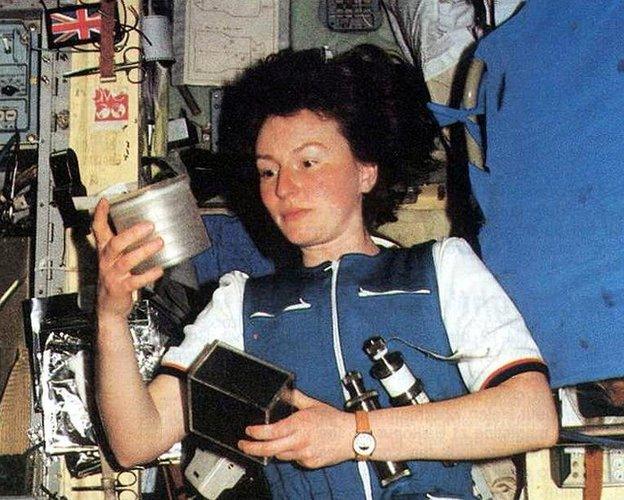
Helen Sharman spent just over seven days in orbit in 1991
Her Project Juno flight was backed by a consortium of private sponsors who were keen to see a Briton in orbit. The consortium failed to raise the required funding but the mission went ahead on the orders of Soviet premier Mikhail Gorbachev.
The hope at the time was that after seeing a Briton in space, London would change its policy. It did not.
"Having flown I really did think there would be another British astronaut in the next few years. The public was so supportive. It was so clear that people wanted Britain to be part of this international community of space faring nations," Ms Sharman told BBC News.
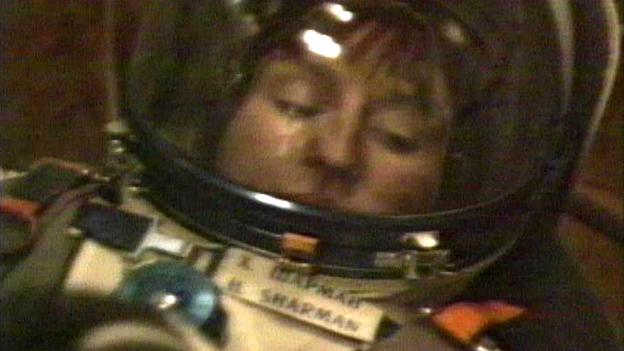
She thought others would follow in her footsteps
For two decades, successive governments chose to stay out of the European Space Agency's human spaceflight programme. In the meantime, more than half a dozen European countries sent astronauts into Earth orbit.
Then, in 2013, the coalition government did join, committing £27m in 2012 and further £49m in 2014. These contributions paved the way for Tim Peake's mission to the International Space Station (ISS). According to Ms Sharman, the UK became involved just in the nick of time.
"If we hadn't got involved in the International Space Station soon, we would really have been left behind. So this was a last chance for the UK and I think fortunately the government understood and decided to fund it. We have got Tim in space and we need to continue that funding."
The next decision point comes in December, when ministers from Esa member states meet in Lucerne, Switzerland, to approve the next phase of space agency projects. Esa nations are expecting the UK government to fund human spaceflight programmes at least to the recent level.
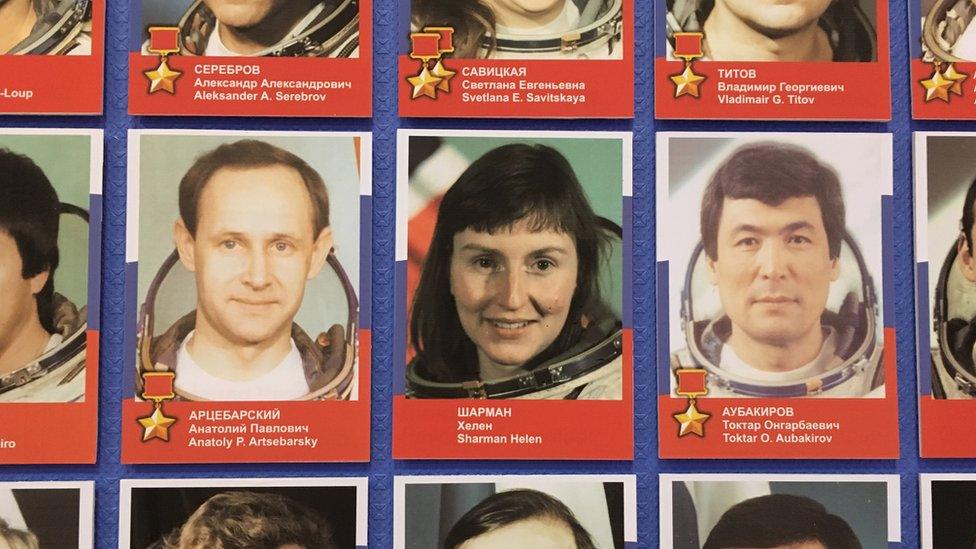
Ms Sharman is immortalised on the wall of the Gagarin Museum at Baikonur Cosmodrome
"If not then the fledgling industries that have started to develop now will be cast aside (as will) projects about human spaceflight that are happening in universities involving people around the world. If we don't continue funding for human spaceflight, these scientists will dissipate. So we need that funding to continue after Tim's flight," says Ms Sharman.
The Science Minister Jo Johnson said that the UK would play a "leading role at the Esa's Council of Ministers later this year, setting out our priorities for space investment through the Esa up to 2020.
"The UK space industry is booming, almost doubling in size over seven years. Backed by government investment through the European Space Agency, British engineers are building the rover that will lead the search for life on Mars, and through Tim Peake's mission and government funding we're playing our full part in scientific research aboard the International Space Station," he said.

Do you have what it takes to be an astronaut?
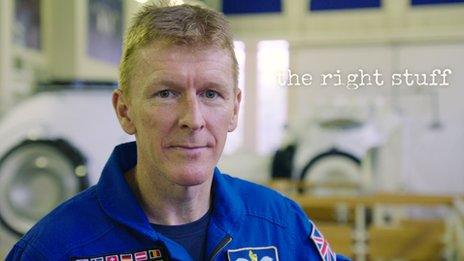

The former science minister, David Willetts, told BBC news that he "hoped and believed" that the prime minister, the business secretary and the current science minister all wanted to continue to send UK astronauts into space: "They are so excited by what Tim Peake is achieving they will want to carry on the momentum that we have got. I would be very surprised if the government did not continue to support these kind of initiatives."
Dr David Parker, the director of human spaceflight and robotic exploration at Esa said Tim Peake had built upon Helen Sharman's legacy.
"We hope that our astronaut programme will continue with further science return coming back from the space station and, beyond that, more distant voyages into deep space."
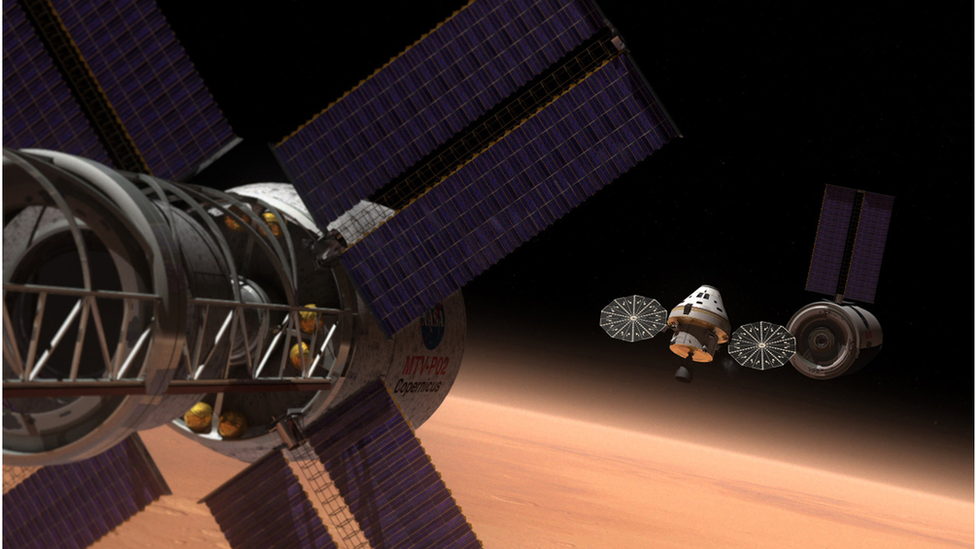
Artist's impression: The UK has to decide if it wants to be part of future missions beyond Earth
Some scientists though believe that funding for human spaceflight could be better spent on robotic space missions. Among them is England's Astronomer Royal, Prof Lord Rees of Cambridge University.
"I personally think it would be better if Esa spent all its money on unmanned projects. If we think of the Rosetta mission that landed on a comet and Nasa's New Horizons mission to Pluto - just think how bright the prospects are with today's and future robotic technology."
That view is echoed by Prof Andrew Coates of University College London's Mullard Space Sciences Laboratory. Prof Coates is involved in building Europe's first Rover to Mars which is due to be launched in 2020.
"The UK continues to lead in robotic exploration, including recent and planned missions to Saturn, Jupiter, Mars, Venus and Mercury. The ExoMars 2020 rover will be a huge mission for the UK with both academia and industry strongly represented, and we are inspiring students with this. Tim's mission is undoubtedly a huge source of inspiration, but priorities for the future will have to be weighed up for the best overall return to the UK."
Ms Sharman, however, believes robotic missions simply do not capture the imagination in the same way that sending astronauts into space does.
"When we think of the long-term future of the human race, this is connecting us with the rest of the world, where we are going to be living when we can't live on this planet anymore. I think Britain wants to be part of that."
And would she like to go back into space herself?
"I have never met a single astronaut who would not go back into space and I'm no exception. I'd love to go back."
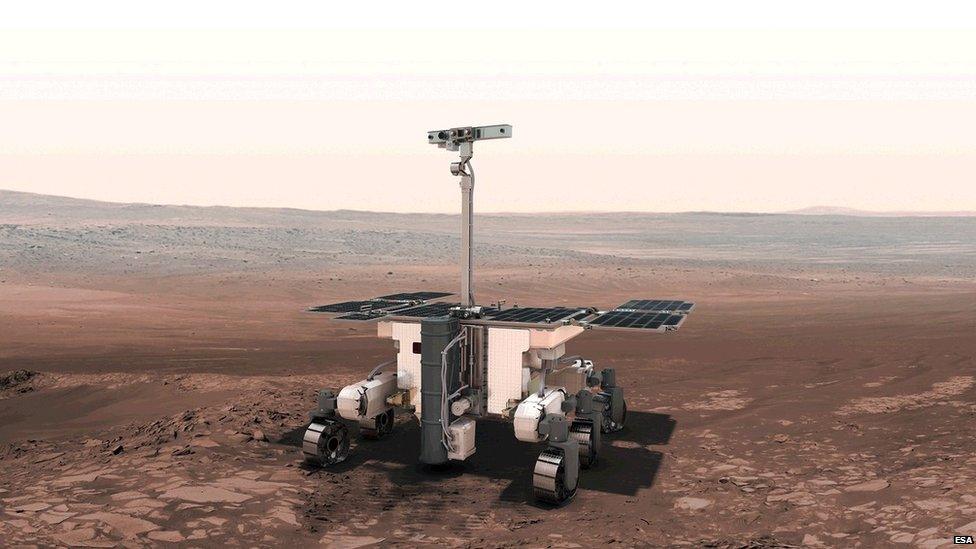
Artist's impression: The UK is leading the development of a robot rover to go to Mars
Follow Pallab on Twitter, external
- Published15 December 2015

- Published10 December 2015
